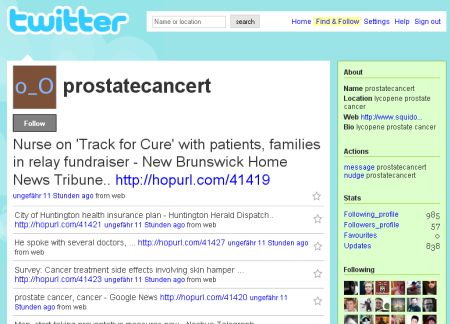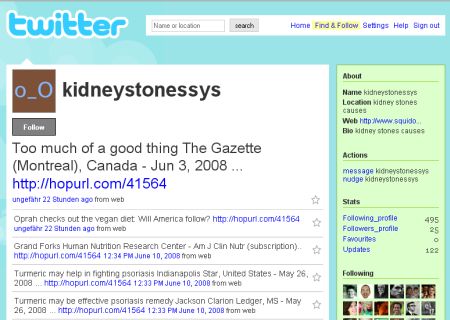Samsung drag and drop world
here is a nice viral by Samsung:
(thanks.)
here is a nice viral by Samsung:
(thanks.)
I was going to comment on Pete Blackshaws Post „Twitter Spam„, but unfortunately, the long and complex typekey registration process put me off. So I will comment here and trackback, why not. And I can even add my own screenshots.
In his post, Pete suspects twitter now having spam profiles. I second that, I have a Chinese Hotel,a kidney stones and a prostrate cancer follower. Seems like twitter is slowly becoming a playing field of professional spammers, too.



Twitter has had quite a few technical problems lately. Some people take it the humorous way, some even programmed a website where you can check whether twitter is down or not. (reminds me of isitchristmas.com some people have way too much time…)
Twitter has become very popular. More than one million people are tweeting, some are updating their status many times a day. Many people have started using it as an instant messaging tool at the same time. Works fine, and you can even use it seamlessly on the go, on your mobile phone.
But since twitter started having their problems more frequently, people have started to complain. Of course it’s a bummer, if you can’t update your status (even though I can happily pass on quite a few of the statusses some people publish all the time). And it’s even worse if you’re depending on the IM feature of twitter. But heck, if you need a better IM tool, get skype, msn, icq or any of those!
So far, twitter does not take any money for their services, nor is there any advertising financing it. I really do wonder how they make their money? Is it just with the inbound SMS messages? Do they actually include a margin on top of what you need to pay for SMS anyway? I wouldn’t know, because I am sending my twitter SMS from Germany to the UK (where the only twitter number in Europe is available) and I wouldn’t know how much regular SMS would cost in contrast to the twitter SMS.
My question is: can/should you really complain so loudely about the failures of a free service? If their business model was already advertising financed, or if they would charge for their services, I could understand all those people complaining.
But this way, I think people should rather use and enjoy it, while it works, and if it doesn’t, be patient. In Germany, we have an expression saying: „einem geschenkten Gaul schaut man nicht ins Maul“. (Means, basically: if someone gives you a horse as a present, don’t bother checking for its health.)
PS: as I write this, twitter is down once again.
Just when you thought that everybody who wants to use a (corporate) blog in their communication has tried (and sometimes failed miserably), Becks opens the bottle and starts a blogger casting.
Here is what they want:
You live by the blog. You have a way with words that hold people captive. And you don’t shy away from being in the public eye. Then we want you. Give your two cents worth, and we’ll give you a handsome salary and other bright perks. Your name and blogs will be seen by many around the world. Others have 365 days, you have 365 entries in a year. You get to work with Beck’s and a congenial creative team in Amsterdam, The Netherlands. You might even relocate to a greener pasture. Sounds too good to be true?
Adverblog found a quote from a press release:
„Our consumers actively seek out links to new trends and genuine material from around the globe. They have a desire to learn about people who share the same values as they do. The Beck’s new columnist will help uncover and highlight relevant and exciting topics for our consumers, enabling us to better connect with them.“
The idea is not new, but it could work well for becks, if the blogger manages to connect will with the becks consumer. But there are several possible negative outcomes:
In either case it is a comparatively small investment (at the cost of probably only a few TV commercials) with a large possible upside to it.
Googletube just announced a new mechanism through which advertisers can book preroll ads precisely on those ads, that are on their way to become viral. Sounds great, considering the fact that there are around 150.000 new clips uploaded to youtube everyday.
YouTube buzz targeting works on an algorithm that looks at a number of viewer activities, including how many times a video is chosen as a favorite, how favorably it’s rated, and how quickly it picks up views, to determine which clips are about to „go viral.“
Advertisers can capitalize on the momentum by choosing to run overlay ads on these videos, with the possibility of combining buzz targeting with other options like time of day, gender and category targeting. As with all YouTube products, the ads only run on partner videos–or content from professional, semi-professional and even amateur producers that fit the targeting criteria, and have their express consent. (from here)
In the same article from which I got the quote above, Eric Schmidt ist quoted saying that the best youtube products will come out this year. This is one of them – some others might concern the tracking and measurement offerings, which have also greatly improved over the last couple of weeks!